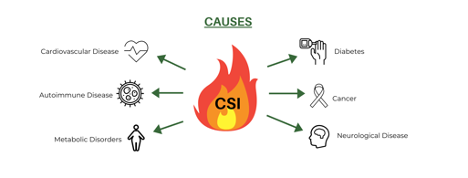Inflammation is one of the most talked-about health concerns, but if you ask most people what it is, they start to shuffle their feet, mumble a few words and then throw up their hands and admit that they’re not really sure.
Maybe you feel the same.
You might know what it feels like in your body and you might even know what triggers your inflammation, but when it comes down to it – you’re not really sure why it’s so important that you reduce inflammation in your body.
So, instead of wondering why you should care, let’s get into the weeds with inflammation.
What Is Inflammation?
Simply speaking, inflammation is the body’s natural response to protect itself from infection, injury, and toxins and return your body to its natural state. When your body’s cells are damaged, it triggers your immune system to send white blood cells to surround and protect the area – often creating redness and swelling.
This is commonly known as acute inflammation which happens when you get a cut, bang your knee, or otherwise get injured. The process usually lasts a few days and is designed to help your body heal.
Chronic inflammation, on the other hand, happens when your body’s immune response continues, leaving your body in a constant state of vigilance. It’s like the inflammatory switch gets turned “on” permanently, which can cause damage to cells and even negatively impact your tissues and organs.
Chronic inflammation can be particularly damaging to your heart or organs especially if over time you become overweight. When you’re overweight you might have more visceral fat cells (the cells that surround your organs). With chronic inflammation, your immune system sees those cells as a potential threat and begins to attack them with white blood cells. As your body remains in a constant state of inflammation over time, the more likely that the surrounding organ is damaged.
Scientists have shown that chronic inflammation may be related to several long-term diseases including heart disease, cancer, arthritis, neurological disease, and autoimmune diseases.
What Causes Inflammation?
So, as I shared, inflammation is the body’s natural response to anything that may threaten the body’s natural homeostasis. Chronic inflammation may begin as a result of a number of factors including persistent infections, toxins, poor diet, environment, stress, and even poor sleep.
It may also be caused by an autoimmune disease itself.
Experts also believe that smoking, alcohol, chronic stress and obesity may be contributing factors to developing chronic inflammation.
How Do You Reduce Chronic Inflammation?
Traditional medicine often treats inflammation with NSAIDs (Advil, aspirin, Aleve) and sometimes with steroids, but most holistic (and even traditional) healers will tell you that nutrition plays a key role when it comes to managing your inflammation.
What you put in your body can make your chronic inflammation worse or improve how you feel.
So, what should you eat and what should you avoid?
Foods like sugar, alcohol, refined carbohydrates, fried foods, red meat, and processed foods are all known to increase inflammation.
Foods like spinach, kale, broccoli, olive oil, lean meats, fatty fish, nuts, and fruits like cherries, berries, and oranges are said to improve chronic inflammation.
Studies have even shown that those who eat a mostly Mediterranean diet have lower inflammation (not to mention the benefits to your heart from eating this kind of diet). Plus, adding certain spices to your diet which have been shown to help with symptoms of chronic inflammation, including garlic, ginger, and cayenne, can help your symptoms too. You may have also heard that antioxidant-rich foods are also potent anti-inflammatory agents, but I will caution that it can be highly individual so it’s good to discuss with your healthcare provider.
Sometimes supplements can also reduce inflammation in the body. I often recommend my clients try adding Omega-3s (fish oil), lipoic acid, and curcumin as a way to relieve the pain associated with inflammation.
One last thing I often recommend is reducing stress. It may not seem as directly connected, but stress and living a stress-filled lifestyle can put stress on your body’s natural immune system and send it into overdrive.
Stress weakens your body’s natural ability to return back to homeostasis (normal) and if you are perpetually stressed out, chances are that your body is too – so if you aren’t already using mindfulness tactics then it’s time to consider this as an option to battle your overall inflammation.
To reduce your inflammation, I’ve created a quick 3-Day Anti-Inflammatory Meal Plan to help you get started.
Click on the link to get your copy today.
And if you think that you’re symptoms are being caused by inflammation, you can schedule a session (virtual or in-office) to learn more about how we can personalize a plan for you.
In good health,
Meryl
Stay tuned in the upcoming weeks for my new YouTube channel: The Rebel Dietitian – we’ll be talking about inflammation, genomics, and all things good health.
